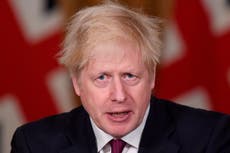Police will not set up roadblocks to stop people travelling out of tier 4 areas, leaders say
Police will continue to hand out fines as a ‘last resort’ and cannot enter homes without permission to check for breaches
Police will not set up roadblocks to stop people travelling out of tier 4 areas to areas of the country with lower coronavirus transmission rates, police leaders have said.
Martin Hewitt, chair of the National Police Chiefs’ Council (NPCC) said police would “step up visibility” to encourage the public to follow the rules more widely.
“There is no intention to establish roadblocks or routinely stop vehicles,” he added.
“We will continue to engage with the public and where they are outside of their home without a reasonable excuse, we will engage, explain and encourage them to follow the rules. Where necessary, we will enforce through the use of a fixed penalty notice.”
British Transport Police said there would be an “enhanced presence” at railway stations and major hubs, following images widely shared on social media of packed platforms of crowds waiting for trains leaving London on Saturday.
Assistant Chief Constable Sean O’Callaghan said: “As has been the case throughout the pandemic, officers will be supporting rail staff through high-visibility patrols across England, Scotland and Wales, ensuring those on the network are safe.
“Our policing method remains the same – officers will engage with passengers and only use enforcement if absolutely necessary.
“Anyone planning a journey over the festive period is urged to consider whether travelling is essential and encouraged to stay at home as per latest government advice. This is a difficult time for all of us, but these restrictions are in place to save lives, stop the spread of the virus and support the NHS.”
The Metropolitan Police said officers would be patrolling busy areas of the capital, as well as places where the virus is spreading rapidly.
“Across the city, officers will be deployed to take action against those people whose selfish action risks jeopardising the health of Londoners,” said Commander Alex Murray.
“Our fight against the virus is not over. The rules are very clear and our collective actions in the next two weeks will have a direct impact on how quickly our city will recover. If people ignore these new rules, make reckless decisions that risk lives, I make no apology for the subsequent enforcement action that will follow.”

The Metropolitan Police Federation, which represents rank-and-file officers in London, said there was “no way” officers will be knocking on the doors of “normal” homes to check the rules are being followed.
“We won’t be knocking on people's doors at all, unless there is a large group and noise, ie a party or something like that,” chairman Ken Marsh told BBC News, explaining that police have no power to force entry to homes without being invited inside.
New restrictions were announced by the prime minister on Saturday, when he said the situation had “deteriorated” because of the rapid spread of a new strain of coronavirus in London and southeast England.
Boris Johnson said the variant may be up to 70 per cent more transmissible than the old variant and that the government had to “act” now.
Laws that came into force at 7am on Sunday introduced tighter tier 4 restrictions in the worst affected areas, and a planned five-day relaxation over Christmas was reduced to Christmas Day for the rest of the country.
They state that “no person who lives in the tier 4 area may leave or be outside of the place where they are living without reasonable excuse”, but there is a long list of exemptions.
They include visiting a linked household or linked childcare household, support groups, work, education, restricted weddings and funerals and medical care.
People can also leave home for shopping, exercise and animal welfare.
New guidance issued to police officers across England confirms that they will continue to use the same four-step model used throughout the pandemic before fining people.
A document made public on Monday said that officers do not have to make “repeated attempts to encourage people to comply with the law” before issuing a penalty.
But it added: “The initial police response should be to encourage voluntary compliance … engage, explain, encourage and only enforce as a last resort.”
Police are leading the enforcement relating to restrictions on movement and gatherings, while councils and trading standards are in charge of businesses who have been ordered to shut.
Anyone contravening the law applying to their local tier can be handed a £200 fine for a first offence, which is reduced to £100 if paid within two weeks. The amounts double for each subsequent offence, up to £6,400 for the sixth and subsequent offences.
Anyone found to have organised or facilitated an illegal gathering can be fined £10,000, and separate laws are in place governing the wearing of masks, travel and self-isolation.
Mr Hewitt said: “These restrictions will be upsetting for many after a very challenging year, but most people will want to do what they can to protect public health and the health of their loved ones.
“We urge everyone to follow the rules in their area, and as throughout the pandemic, we are confident that the majority of people will continue to do their best to adapt and do the right thing. Those who blatantly ignore the regulations should expect to receive a fixed penalty notice.”
Join our commenting forum
Join thought-provoking conversations, follow other Independent readers and see their replies
Comments




Bookmark popover
Removed from bookmarks